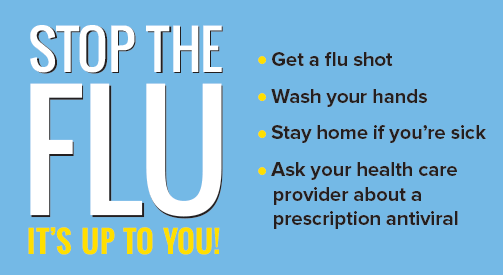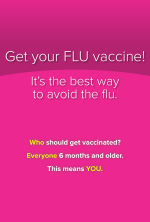What You Should Know About the Flu

The flu is not just a really bad cold. The flu is a contagious illness that affects the nose, throat, lungs and other parts of the body. It can spread quickly from one person to another. It can cause mild to severe illness, and at times can lead to death.
The best way to prevent the flu is by getting a flu shot.
Every year in the U.S., on average:
- 5% to 20% of the population gets the flu,
- More than 200,000 people are hospitalized from flu complications, and;
- The flu causes about 12,000 to 56,000 deaths each year. About 90% of these deaths occur in people 65 years or older.
Everyone 6 months or older should get a flu vaccine every year
The flu vaccine is not approved for children younger than 6 months old. But, infants in this age group have a higher risk of flu complications than children of any other age.
The best way to protect children younger than 6 months is to make sure members of their household and their caregivers are vaccinated.
- Flu Vaccine Clinics in New York State
- HealthMap Vaccine Finder – find pharmacies and clinics offering vaccines near you
- Contact your local health department for information about flu vaccine clinics in your county
- Information on the Flu Vaccine
- Information on Flu
People at high risk of flu complications
Some people, such as older people, young children, and people with certain health conditions, are at high risk for serious complications from the flu. This includes women who are pregnant. If you are pregnant, the flu is more dangerous for you. Those who live or work with people who are at high risk should get vaccinated against the flu.
- Information for Pregnant Women and New Mothers
- Information for People with Chronic Health Problems
- People at High Risk of Developing Flu–Related Complications (cdc.gov)
You can't get the flu from getting the flu vaccine
The flu vaccine does not give you the flu. It stimulates your body to produce antibodies. These antibodies protect you from flu viruses.
Once you get the flu vaccine, it takes about two weeks for it to be fully effective. Until then, you are still at risk for getting the flu.
How the virus is spread
The flu usually spreads person to person when someone with the flu coughs or sneezes. Sometimes people get the flu because they touch an object or surface with flu virus on it -- and then touch their mouth or nose.
Information on the Flu Vaccine
- Preventing Seasonal Flu With Vaccination, CDC
- Misconceptions about Seasonal Influenza and Influenza Vaccines, CDC
- Influenza Vaccine Safety, CDC
- Personal Stories: Why Flu Vaccination Matters, CDC
